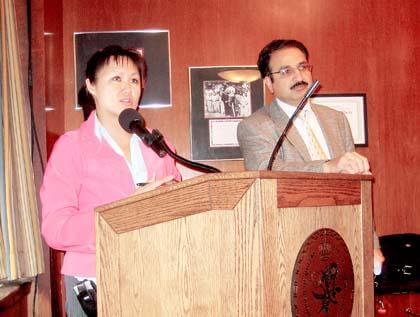By Anna Gustafson
The city is ramping up efforts to fight West Nile Virus in Queens this year after the number of mosquito pools testing positive for the virus increased last year, city Department of Health officials said at the Queens Borough Cabinet meeting Tuesday.
“We are increasing outreach activities, surveillance and breeding source reduction,” Waheed Bahwa, director of the Office of Vector Surveillance and Control at the Health Department, said at the meeting at Queens Borough Hall.
There was a spike in the number of mosquitoes testing positive for the virus in New York City with 197 positive pools in 2008, compared to 174 in 2007.
The city, however, experienced a decrease in the number of human cases of West Nile in 2008, with 15 cases compared to the 18 in 2007. There was one West Nile Virus-related death in the city in 2008, compared to three deaths in 2007. There were no deaths in Queens in 2008 or 2007. There was one death in the borough in 2006.
The first outbreak of West Nile Virus occurred in College Point in 1999. West Nile is a mosquito-borne virus that can infect humans, birds, horses, and other mammals. It can cause flu-like symptoms or, in some cases, death.
There are many more cases of West Nile Virus in New York City, and in cities in general, as compared to areas like Suffolk, Nassau or Westchester because cities provide “favorable environments for the mosquitoes,” such as stagnant water, Bahwa said.
In response to the increased number of mosquitoes testing positive, the city will now run 88 trap sites, or locations where they analyze the mosquitoes for West Nile Virus, up from the 81 sites in 2008, Bahwa said.
Bahwa and Tammy Lee Christensen, community affairs coordinator at the Department of Health, said they are increasing efforts to have residents report locations of standing water to the city through 311. Department of Health officials will investigate every report of standing water.
The department will continue its aerial and ground sprayings to kill mosquitoes throughout Queens. Bahwa said the city will conduct aerial sprayings only at non-residential sites, including Dubos Point and Edgemere Park in the Rockaways, Flushing River, the Alley Pond Marsh area, and the abandoned Flushing Airport.
In addition, Christensen said officials were launching a program to notify residents about mosquito sprayings in their communities via cell phones, text messages, land lines, e-mails, and pagers. City officials will alert community boards via fax and e-mail about sprayings, Christensen said.
Reach reporter Anna Gustafson by e-mail at agustafson@cnglocal.com or by phone at 718-229-0300, Ext. 174.

































